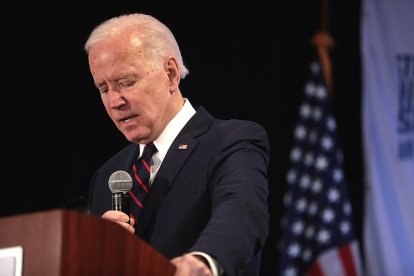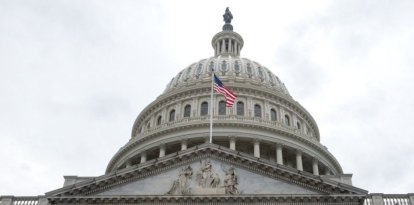Why Did the Biden Administration Oppose Israeli Judicial Reform?
Washington is as determined as the anti-Bibi resistance not just to stop judicial reform but to oust a democratically elected government by any means possible.

(Cordon Press)
It didn't play a decisive role in the drama that unfolded in Israel as Israeli Prime Minister Benjamin Netanyahu was forced to call a halt to his efforts to enact judicial reform. But the Biden administration's willingness to involve itself in the push to oppose the measure was remarkable for two reasons.
The first is that, as The New York Times noted, Washington made no secret of its efforts to directly intervene in a domestic Israeli dispute in a manner that was almost unprecedented. The second was that the standard by which the administration seems ready to judge its Israeli counterpart is entirely hypocritical and would, if applied to Biden, categorize him as just as much of an "authoritarian" as Netanyahu. Or at least it would if those scurrilous accusations that have been hurled against the Likud-led government by its opponents—and dutifully mimicked by the international media, as well as many Democrats and American Jewish organizations—weren't entirely false.
But however unpersuasive or politically motivated, what the Times termed a "U.S. pressure campaign" to shelve the reform legislation had nothing to do with a belief in the virtues of Israel's current judicial system.
If they favor the continued rule of what amounts to a juristocracy in the Jewish state, it is for the same reason that most of the people who jammed the streets of Israel's cities or sought to undermine its economy and national defense did. They see the maintenance of an unaccountable court with virtually unlimited power as the only way to maintain the Israeli left's political power even when they lose elections, as Netanyahu's opponents did only a few months ago.
Even more to the point, Washington is as determined as the anti-Bibi resistance not just to stop judicial reform but to oust a democratically elected government by any means possible. Biden's interest in toppling him is disconnected from any purported concern about Netanyahu's alleged shortcomings. What the White House and State Department want is a more pliable Israeli prime minister who will keep quiet about the nuclear threat from Iran and who can be intimidated into not acting to forestall that deadly threat to Israel's existence.
As to the substance of the American critique of the effort to reform Israel's judiciary, as a JNS report described, the hypocrisy of Biden's stand is epic in nature.
Democrats and their liberal Jewish supporters are vocal critics of the U.S. Supreme Court because of its current conservative majority and its willingness to enforce constitutional limits on the power of the state. Biden and the Democrats have been assailing the independence of the court for years with Senate Majority Leader Chuck Schumer (D-N.Y.) even issuing warnings against its conservative members that liberals would have labeled as incitement to violence, if not criminal threats, had they been uttered by a Republican.
Equally hypocritical is their talk about Netanyahu being at fault for not seeking a national consensus before trying to enact change with a narrow parliamentary majority. That never stopped Democrats from advancing ideas that they considered to be progressive innovations, like Obamacare, with no consensus, compromise or broad congressional support. Nor did it stop liberal American Jews from supporting the disastrous Oslo Accords or the disengagement from Gaza, which were pulled off with even less support in the Knesset than Netanyahu can boast.
Washington is as determined as the anti-Bibi resistance not just to stop judicial reform but to oust a democratically elected government by any means possible. Biden's interest in toppling him is disconnected from any purported concern about Netanyahu's alleged shortcomings. What the White House and State Department want is a more pliable Israeli prime minister who will keep quiet about the nuclear threat from Iran and who can be intimidated into not acting to forestall that deadly threat to Israel's existence.
As for behaving like a dictator, Biden's predilection for governing by executive order—of which his canceling of student loan debt is just one outstanding example—even when his diktats are obviously contrary to the Constitution or existing laws makes anything Netanyahu might attempt look like child's play. Biden bristles at the ability of American courts to strike down some of his more egregious initiatives, even when they do so on the basis of settled law. But his administration apparently thinks that when Israel's Supreme Court strikes down Netanyahu's efforts to govern—on the basis of no law and only on the judges' subjective ideas about what is "reasonable"—it's a great idea.
The same applies to the critiques of judicial reform that emanated from establishment Jewish groups like the American Jewish Committee and the Anti-Defamation League. And though the Conference of Presidents of Major American Jewish Organizations is supposed to speak for a consensus of all Jewish groups and act in defense of Israel rather than specific political factions inside the country, it joined the liberal groups in praising Netanyahu's surrender to the mob. It then had the chutzpah to laud the protesters, who sought to sabotage the country to get their way without even any attempt at balance by treating supporters of the government and reform, who clearly outnumbered the critics at the ballot box last November, as equally praiseworthy.
A number of the leaders of those groups may share the fear and contempt for Israel's right-wing and religious voters that animate many, if not most, of the protesters who believe that any government that isn't dominated by the left is somehow illegitimate. But they also understand that the hyperbolic claims that Netanyahu and advocates of judicial reform seek to impose a dictatorship or a Torah state is pure fiction.
Yet it isn't an accident that arguments being floated about the issue of Israeli judicial reform from American sources are so weak and unpersuasive. What Biden and his supporters want in Jerusalem isn't so much an all-powerful Supreme Court—though they are pleased if it can hamstring Netanyahu's attempt to govern, as it has continually attempted to do—but anything that can help oust the prime minister.
The Biden foreign-policy team, largely made up as it is of Obama administration alumni, bears a grudge against Netanyahu. The eight years of bickering between Washington and Jerusalem centered on former President Barack Obama's futile efforts to undermine Netanyahu and force him to make concessions to a Palestinian Authority that had no interest in peace. They reached a peak in 2015 during Netanyahu's campaign to try and halt Washington's push for appeasement of Iran, which led to the dangerous nuclear deal that year that enriched and empowered the Islamist regime.
While Biden seems to have wisely disabused himself of myths about the Palestinians wanting peace, he is still interested in realigning U.S. Middle East policy away from support for allies like Israel and Saudi Arabia in favor of a rapprochement with Iran, even if his efforts to revive the nuclear deal have flopped.
Under the current circumstances in which Iran has shown its contempt for the Americans, Biden is still eager to avoid any confrontation with Tehran over the fact that, thanks to the Democrats' appeasement policy, it is fast approaching the status of being a threshold nuclear power. As one of Biden's most loyal aides—chairman of the Joint Chiefs of Staff Gen. Mark Milley—recently made clear, the administration is now willing to tolerate Iran having nuclear weapons as long as they are not going to publicly flaunt them.
This attitude isn't just unacceptable to all of Israel's major political parties. It constitutes a grave threat to the security of the Jewish state that no Israeli prime minister could reasonably be expected to tolerate. But there is a big difference between Netanyahu and someone like opposition leader Yair Lapid, whom Biden hopes will soon return to the prime minister's office. As the multi-party coalition that ruled Israel from June 2021 to December 2022—led in part by Lapid—demonstrated, no one other than Netanyahu has the guts to confront the Americans, even over an existential threat like Iran. Biden knows that if the current government survives, it will present a formidable challenge to the disgraceful policy that Milley articulated.
So while there is nothing new about American governments seeking to intervene in Israeli politics, the brazen nature of Biden's attack on Netanyahu says nothing about the virtues of judicial reform. It does, however, speak volumes about how much the administration wants an Israeli government that won't cause trouble over Iran.
RECOMMENDATION





















